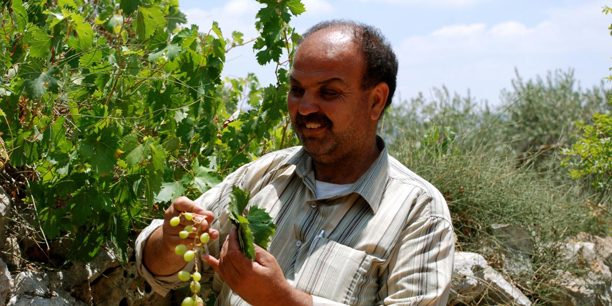
 Trace Your Delicacy
Trace Your Delicacy

 Find Canaan Locally
Find Canaan Locally
Abu Fadi Amin




Abu Fadi Amin
Canaan Fair Trade Olive Oil Prodicer from the village of
Al Rami
Download printable profile (PDF)
BORN IN THE RAIN
When Abu Fadi was born the village of Al Rami in the Jenin district did not have paved roads. “It was a rainy day but my father took my mother in a truck and drove on dirt roads so she can deliver me in Jenin.” This was 45 years ago. Today the village of Al Rami has paved roads, electricity, and water pumps but it still has the charms of a mountaintop small village.
Abu Fadi, who still lives in the same house his parents lived in with his wife, thirteen children, and two aunts, inherited his parents land after they passed. Going down to check on his trees, Abu Fadi brings with him two photos of his father and mother and places them gently on the branches. “These are the people who founded this farm. I am their son and their student.”
Back in his home, his aunt Hamdei tells the story of the living history of their land. Known as the season forecaster, Hamdei can accurately predict the yield of each season based on the weather. An elder, she has lived for almost a century and says that she has seen the impact of climate change slowly altering the features of agriculture. “When I was a young woman, there was a lot more rain, the valleys would have water up until the wheat harvest, end of summer, now the valley is thirsty.” It is not just the land that is thirsty, with political forces controlling water resources; the village of Rami does not receive water every day. Even though several aquifers exist in the area, the village is only allowed to pump so much water while the rest has to be shared with the city of Jenin that is also suffering from lack of water access due to political reasons. “Thank God we have a well on our land. If it weren’t for the rain water we collect we would literally be dying of thirst.”
HOPE AGAINST ALL ODDS
But none of this is stopping the Amin family from continuing their work as farmers. Out of the thirteen children, almost everyone joyfully participates in the field during the olive harvest season. “We love the olive season because we all get together under the olive trees. We take our food and we spend the day from dawn to dusk collecting olives, eating, and singing songs.”
Even their son Mohammed, 21 years old, who has been in Israeli political prison for the last year and a half, is present in the olives. His aunt Hamdeh explains how before he was taken away, Mohammed planted new olive tree saplings that the family got from the Palestine Fair Trade Trees for Life program. “We take extra special care of those trees because he planted them and his spirit is always present in them, and when he calls from prison he always asks about them. Hopefully one day he will be released and he will collect their fruits with his own hands.”
Not certain what the future may bring, the Amin family remains hopeful that the land their ancestors left them will continue to be productive. In Abu Fadi’s words, “the land is a sacred gift, and the olive tree is a sacred tree both religiously and culturally. My grandfather lived over a 100 years because he ate olive oil and natural foods. His body was blessed with the oil of this tree. Regardless of all the challenges, how can I give up on the tree that gives us so much life?”
Sitting in the shade of his giant carob tree, Abu Fadi speaks of the sweet things in life such as the taste of khabisa, a custard like local dish made from starch and carob juice. “How can I lose faith when I have my family and I can share the sweet taste of my ancient carob tree. When I sit under this tree and I ponder the many years it has lived and all the seasons it has endured, I know there is hope.”



